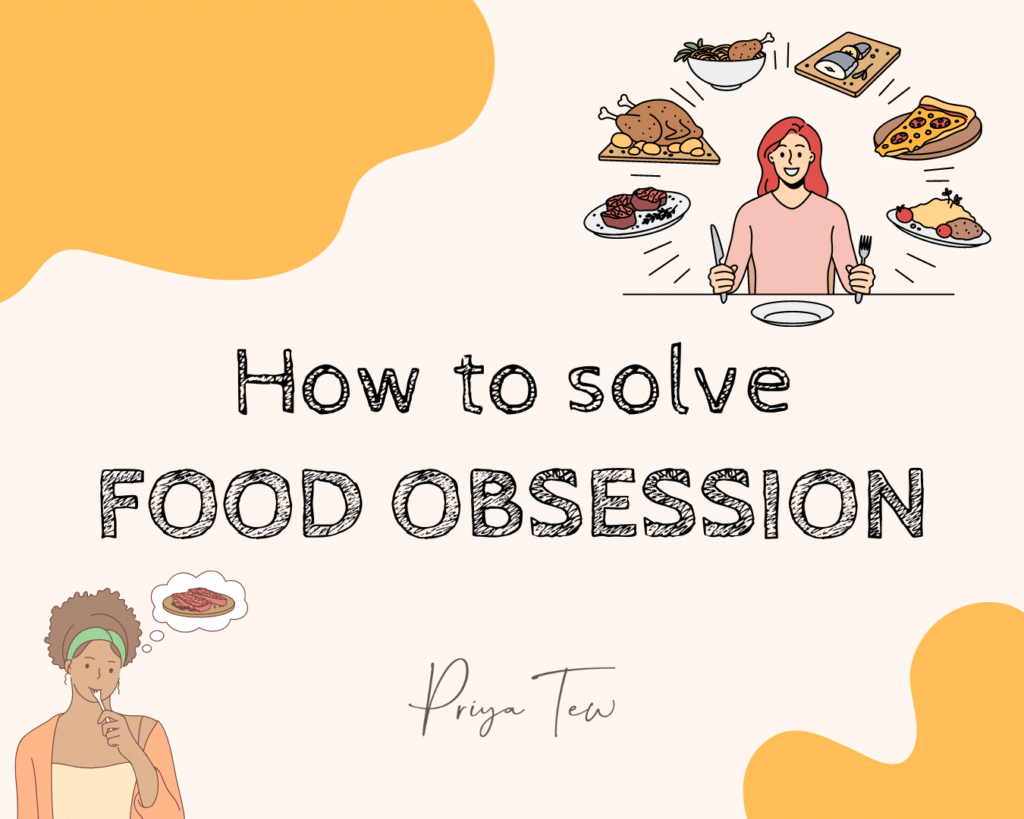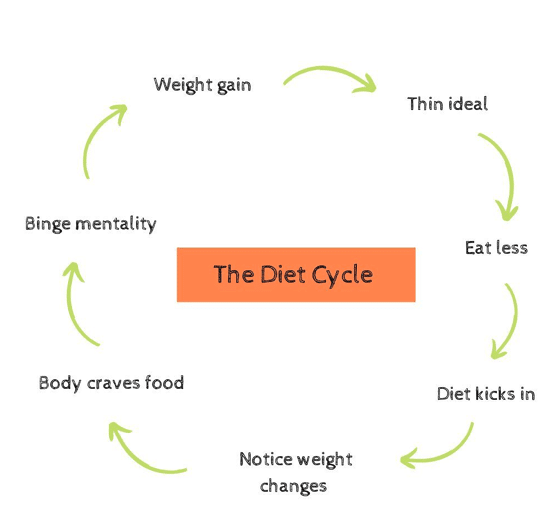When you are constantly thinking about food to the extent it is taking over your concentration and ability to do daily tasks, you may be experiencing food obsession. This isn’t a formal diagnosis, but many people report feeling preoccupied with food to the point that it disrupts their day-to-day. Maybe you are tracking what you eat, constantly thinking about what you will eat or always changing your plans because of food. Obsession with food can take up a lot of your headspace. It can limit your concentration and can even impact your ability to focus at work, studies or social life. Read on for tips on how to work out if this applies to you and if so, how to help.
Let’s dive in…

How do I know I have an obsession with food?
Food obsession can present itself in a number of ways. You may experience some of these behaviours occasionally and not have an obsession with food. However, if you are feeling out of control with any of these, or experiencing several, then you may be showing signs of obsession with food. For example:
- Being distracted from tasks with thoughts of food or your next meal
- Collecting a large amount of recipes
- Changing social plans if they involve being in an “unsafe” food situation
- Tracking of calories and macronutrients
- Cooking or making food that you have no intention of eating
- Watching food shows on repeat or obsessionally
- Having food as your main topic of conversation with others
What causes food obsession?
From a biological perspective, food obsession is protective. If you experienced a food shortage outside of your control, then constantly thinking about food would make you more likely to seek out food and nourish yourself. Preoccupation with food can be your body’s way of avoiding starvation. It can also be emotionally and psychologically driven. Perhaps you experienced a lack of food as a child or maybe you feel guilt for eating certain foods. Then you may experience strong food cravings outside of hunger, particularly if you are avoiding those specific foods.
Foodie vs Food Preoccupation:
There is a huge difference between being a “foodie” and being someone who is struggling with a food obsession. Obsession can be defined as
“the state of being obsessed with someone or something or an idea/thought that continually preoccupies on a persons mind”
Food preoccupation can occur in response to restricting or enforcing rules around food. This could look like:
- Limiting your caloric intake
- Only allowing yourself to eat under certain conditions, e.g. within a limited time window
- Limiting whole food groups, such as going low carb
- Avoiding specific foods e.g. chocolate, crisps, baked goods
- Labelling certain foods as “bad”, even if they’re not completely off limits
All of this can lead to a binge-restrict cycle, you can read more about What is a binge-restrict cycle? in this blog.

- Restrict: start restricting your food
- Crave foods: start to want foods, especially the ones that you are restricting
- Give in (binge): lose control around food and overeat or binge
- Feel guilty: feel bad for losing control around food and start to plan compensating
- Repeat: the cycle begins again
Why do we get obsessed with food?
Have you noticed how it is almost socially acceptable to have disordered eating? No-one bats an eyelid if you say you are cutting carbs, restricting food groups or only eating so many calories a day. This is how diet culture quickly enters into daily life. However these behaviours also overlap with disordered eating, which can lead to eating disorders.
Lets think about why you may develop a food obsession:
- You aren’t eating enough. Physically not providing your body with enough nutrition and energy can trigger the brain to obsess about food. Which is the body looking after itself as it doesn’t want to fall into a semi-starvation state. During the starvation studies 36 fit and healthy men had their calories halved for 6 months. Guess what happened? They become obsessed with food. Dreaming about food, collecting recipes, talking about food, stealing food. The good news is that this stopped as the men ate more and renourished their bodies.
- Your mindset is key. If you see certain foods as bad/offlimits/fordbidden then this can lead to obsessing over certain foods. We want what we cannot have. Deprivation of food can therefore lead to food obsession.
- Learned behaviour can also play a role. How we are taught to see food as a child is key. If you feel deprived or did not have enough food as a child, this could trigger food obsession. Or if food was a reward and certain foods were kept off limits. The role model we percieve from childhood will influence us as adults.
How to move from food obsession to food freedom:
In the simplest terms, if you want to stop being obsessed with food, you need to remove these rules and restrictions. Giving yourself permission to eat food is a key step to reducing feelings of food addiction and instead find food freedom or start on the journey of intuitive eating.
Food freedom means giving yourself unconditional permission to eat all foods, nothing is off limits.
With food freedom we can eat without anxiety or guilt and trust our bodies to tell us what it needs, when it needs it. This is a healthy relationsup with food. You can then eat what tastes good, nourishes you and satisfies your body.
- Eat enough to nourish your body. Regular meals and snacks is the key. You can download my meal planner here. By eating regularly you help the body to feel safe. It removes the threat of entering semi-starvation mode.
- Remove the diet rules. All foods can be eaten and are good! Yes even the chocolate cake, which brings pleasure. Try to remove judgement and guilt from eating. Instead you have permission to enjoy food!
- Learnyour triggers. These can include the food environment, habits, emotions, stress and advertising. These triggers can cause you to crave foods even outside of hunger. In fact, food companies spend a lot of money to make you subconsciously want to eat (and buy!) their products. Becoming aware of your triggers can help you to reduce the situations that drive your feelings of food obsession.
- Get support. Find someone to chat this through with, a supportive friend, a therapist or a dietitian. It can really make all the difference. Remember us dietitians are not the Food Police but are here to help.
I offer 1-1 support so do get in touch if you need some help.
Hi Priya, I am just wondering if you have any references for your above text? I am a nutritionist and wld love to read a bit more about it. Thank you. Alexandra
Hi Alex sorry to miss your comment this may be interesting to read: https://www.apa.org/monitor/2013/10/hunger